Q&A: Malaysia's new trade minister explains why China matters to Southeast Asia
Caixin sat down for an exclusive interview with Malaysia's new Minister of International Trade and Industry Tengku Zafrul Aziz on the sidelines of the World Economic Forum (WEF) in Davos, Switzerland, in January. He spoke about Malaysia's and ASEAN's relations with China, and his thoughts on regional and global trade.
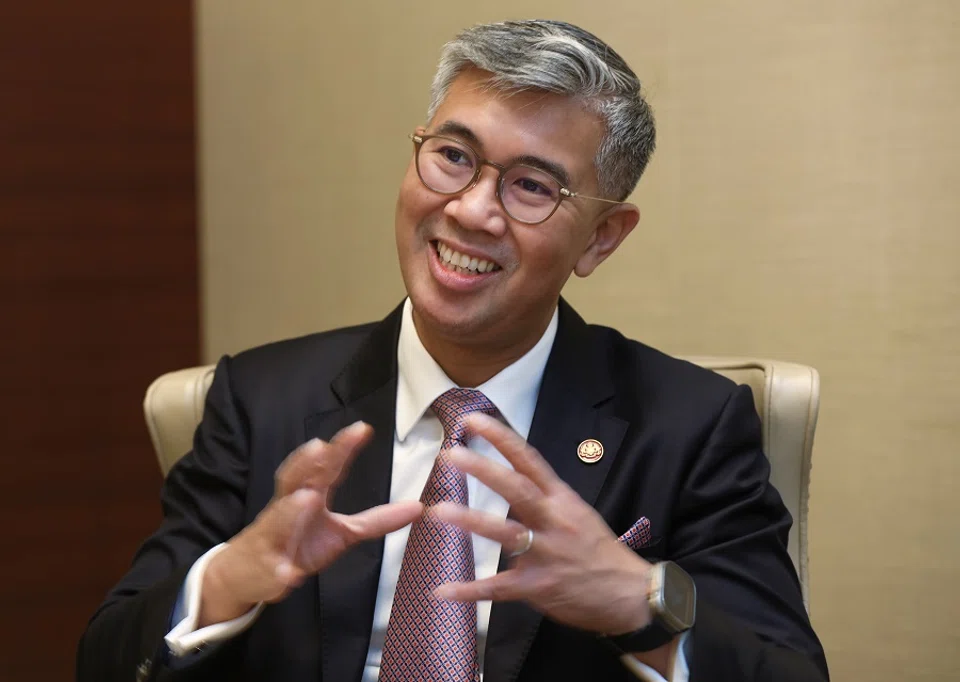
(By Caixin journalists Wang Duan, Wang Xiaoqing, Han Wei, Yang Min, Kelly Wang and Wang Xintong)
With platters of fried shrimp crisps and sticky rice cakes in front of him, Malaysia's new Minister of International Trade and Industry Tengku Zafrul Aziz shared his plans for an upcoming trip to China, as well as his thoughts on regional and global trade.
During an interview with Caixin on the sidelines of the World Economic Forum (WEF) in Davos, Switzerland, in January, Tengku Zafrul said that his primary goal at the event was to reengage with the world on behalf of Malaysia and make sure the country can maintain its post-Covid economic recovery momentum.
During the first three quarters of 2022, Malaysia's GDP expanded by 9.3%, far exceeding expectations. Meanwhile, the Southeast Asian nation's trade volume grew 27.8% in 2022, the highest growth rate recorded since 1994.
However, some economists worry that the rebound in the region was a flash in the pan as political uncertainty in the past two years and the Covid-19 epidemic took a toll on overseas investor confidence in the country.
Political 'rising star'
Following a tightly contested general election that resulted in Malaysia's first ever hung parliament, Tengku Zafrul was appointed by the country's new Prime Minister Anwar Ibrahim in December 2022 to lead Malaysia's trade ministry. This administration will face the challenge of how to reduce the national debt and budget deficit without raising taxes or putting too much of a burden on the lower income group.
Described as the "new kid on the block" by Malaysia's former Deputy Prime Minister Tun Musa bin Hitam, Tengku Zafrul is a "rising star" in Malaysia's complex political world. Prior to the government appointment, he was CEO of CIMB Bank Bhd. and chief executive of CIMB Group Holdings Bhd., the second largest banking group in Malaysia.
With more than 20 years of experience in finance, the 49-year-old banker and investor also served as Malaysia's finance minister during two previous administrations between 2020 and 2022, where he oversaw the implementation of several economic stimulus packages to mitigate the impact of Covid-19 on the Malaysian economy.
... the opening up of China has given a lot of hope for Malaysian companies.
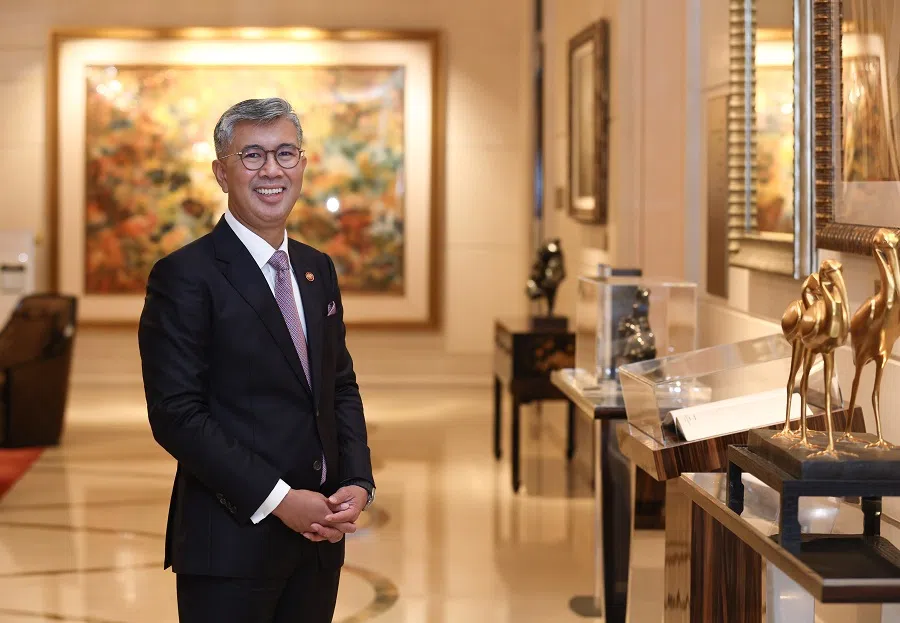
Chong Ja Ian, an associate professor of political science at the National University of Singapore, told Caixin that three administrations with different political party backgrounds entrusted such responsibility to Tengku Zafrul due to his professionalism and ability.
"The position of minister of international trade and industry requires balancing all kinds of relations and interests," Chong said.
Tengku Zafrul studied finance and economics at universities in the UK and is an EMBA alumnus of Tsinghua University People's Bank of China School of Finance. His mother was a senior official of the Economic Planning Unit of the Malaysian Prime Minister's Office from 2004 to 2005 and his father made his mark as a businessman.
China has been Malaysia's largest trading partner for 14 consecutive years. In an exclusive interview with Caixin before the Lunar New Year, Tengku Zafrul said he hopes trade relations between China and Malaysia will grow stronger.
Caixin: As Malaysia's new minister of international trade and industry, can you share your plans about visiting China this year?
Tengku Zafrul Aziz: As China reopened after the Covid-19 pandemic, we are planning to bring a business delegation to go to China in September. China is Malaysia's largest trading partner and has always played an important role when it comes to investment into Malaysia and the supply chain of Malaysian companies.
During the strict lockdown in China, Malaysian multinational companies were also affected. There's a strong political and economic relationship between the two countries and the opening up of China has given a lot of hope for Malaysian companies.
More importantly, 2024 will mark the 50th year of the establishment of diplomatic relations between Malaysia and China. Malaysia is the first country in Southeast Asia to open an embassy and establish an official relationship with China in 1974. This is going be very important, so as the minister of international trade and industry, I need to set it up to ensure that this momentum continues.
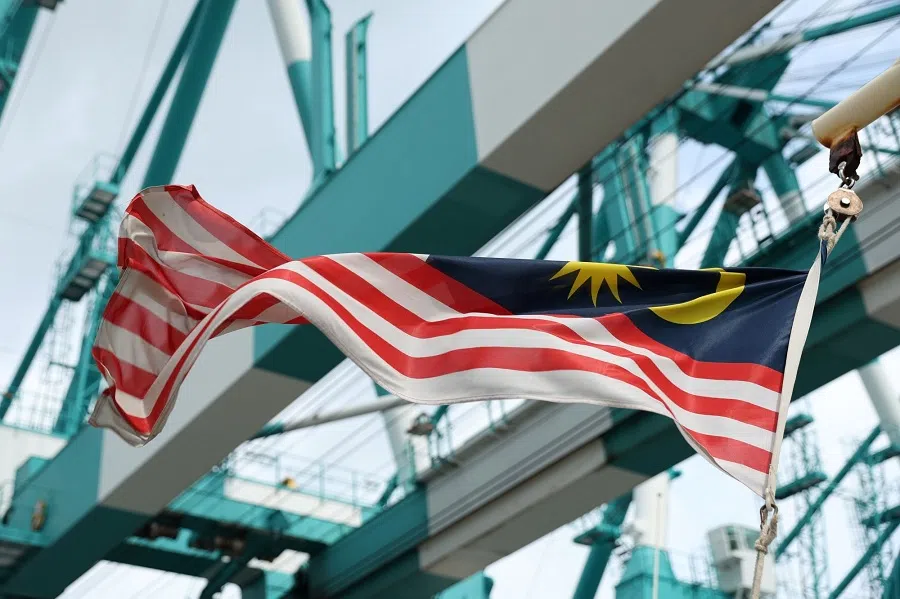
What impact will China's reopening have on countries in the Association of Southeast Asian Nations (ASEAN)?
The opening up of China will have a positive impact to Malaysia and to Southeast Asia. During the global financial crisis in 2008 and 2009, we have seen how China helped the global markets and the global economy when Europe and the US were in recession.
Similarly, this time as the global economy for 2023 looks very challenging - the global outlook from the International Monetary Fund and the World Bank are saying that 2023 is going to be a tough year - the opening of China will help not only ASEAN but also globally. China, being a large economy, will have an impact to the world GDP. For ASEAN, which has always had longstanding, bilateral and multilateral relationship with China, we've been waiting for China to open up and we are optimistic about the impact.
We have seen the impact quite immediately for Malaysia and the region. Thailand and Singapore have already seen their tourism gone up. The second immediate impact is on the supply chain. We are seeing companies able to formulate more aggressive ambitions for expansion, knowing that the supply chain from China is there and more resilient and more secure. We also see more companies looking at China's opening-up as a positive sign for their growth.
... with the opening up of China, the intra-trade within ASEAN will also improve.
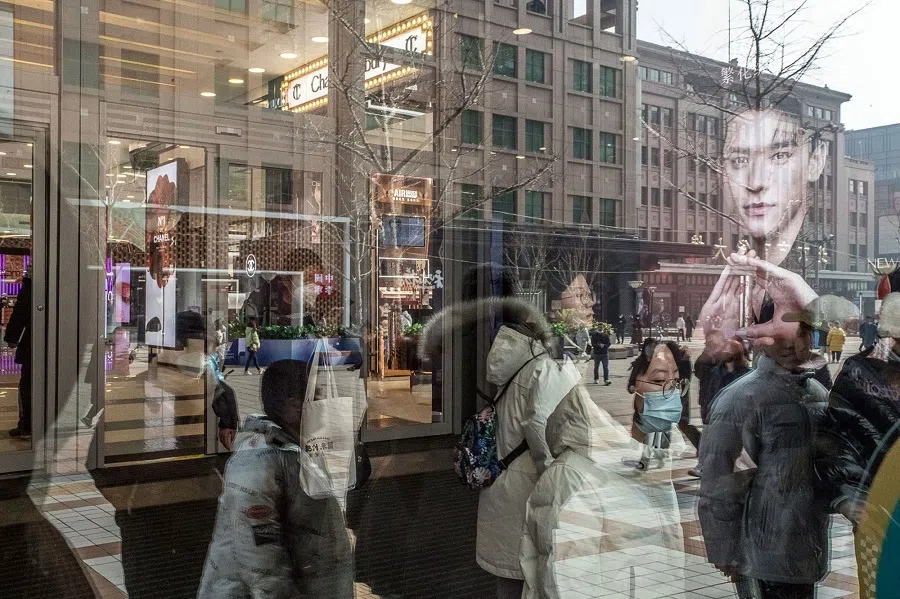
Thirdly, with the opening up of China, the intra-trade within ASEAN will also improve. With globalisation now under threat, China's opening up is something positive. It supports the thesis that globalisation is important for markets and companies. It's also important for people in the era of high inflation, energy prices and cost of living. So any news to help reduce friction when it comes to trade, it will be positive.
What are your expectations for the development of China-Malaysia bilateral relations in the future?
Next year will be the 50th anniversary of the establishment of diplomatic relations between Malaysia and China. It has been a very positive relationship, where both countries have benefited from the trade and political relationship that we have. Our hope is that this will continue for the next 50 years. In fact, Malaysia has been invited to a meeting on the Belt and Road Initiative, which is taking place soon. We will continue to ensure that the bilateral relationship continues to strengthen, especially in terms of trade.
Coming back to this year's WEF, what's the top priority for Malaysia's delegation to highlight during the forum?
We have various companies, both state-owned enterprises (SOEs) and non-SOEs, here to reconnect and reengage with the global community, especially the multinationals. Malaysia has an open economy and we need to continue to engage and remind others that Malaysia is an investment destination.
... we as emerging markets - Malaysia, South America, South Africa, etc - must also tell our side of the story.
We are here for three objectives. First one is to reengage and to ensure that people know what Malaysia is all about. Secondly, Malaysia has just gone through a general election in December 2022 with a new government formed. We are here to tell the story about the new government under the new leadership of our honourable Prime Minister Anwar Ibrahim. There were concerns before this about stability, but now with the new government and a new leader, I think it provides the stability which is important for countries to attract investment. Malaysia now is ready and open for business. Thirdly, we are also here to understand the mega trends and the challenges.
More often than not, the outlook always looks at what the developed countries are saying, but we as emerging markets - Malaysia, South America, South Africa, etc - must also tell our side of the story. Or else, policies and views are dictated by the big countries, usually the developed countries. For example, we talk about environmental, social and governance (ESG) policies and how important they are. No one disputes that. We all agree that it is important, but we need to agree on how we can get there. Many countries in the region have this target to reach net zero. For Malaysia, it's by 2050. But together, we need to make sure that that transition is smooth, just, fair, equitable and inclusive to show that Malaysia and the region are ready to be part of the changes that are required to meet the ESG targets.
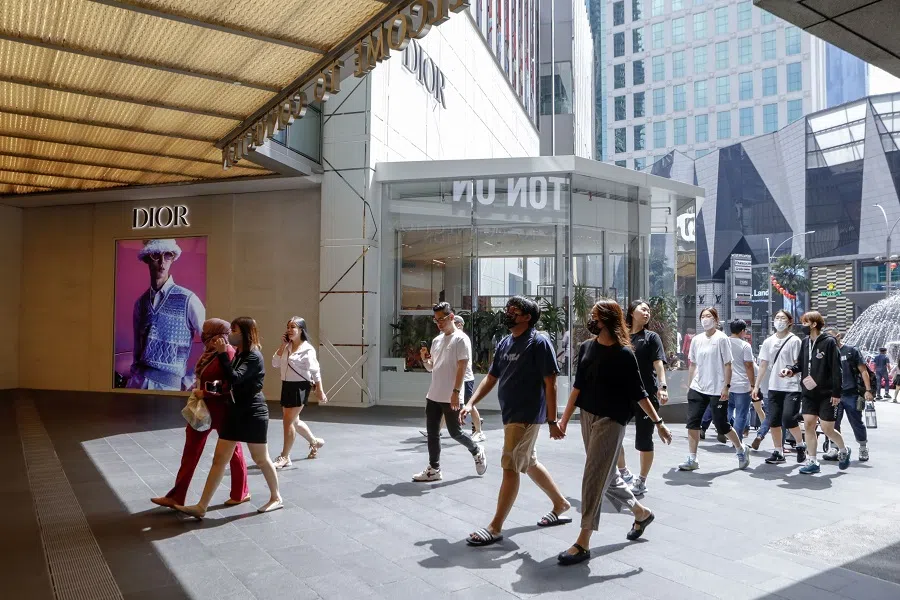
What we don't want is people using ESG to determine trade policies. For example, the European Union has come up with the Carbon Border Adjustment Mechanism, which started on 1 January, where countries that want to export to the EU must comply with the standards. It's done gradually and will be fully implemented by 2027. But we need to understand that developing countries, emerging markets and less developed countries need time to adjust. I think it's important at this forum that the voices of the emerging economy must also be heard.
There's reshoring, friendshoring and onshoring, and many companies who wanted to reshore or friendshore, they look at ASEAN as a neutral place to relocate.
Can you share some of the takeaways from the forum?
What's important to me is engagement. That is the key. There are a lot of follow-ups that need to be done after the WEF for Malaysia. In fact, there are many companies and industry leaders who are planning to come to the region and to understand more about the expansion.
This region does benefit from some of the geopolitics as well. There's reshoring, friendshoring and onshoring, and many companies who wanted to reshore or friendshore, they look at ASEAN as a neutral place to relocate. Malaysia's foreign direct investment has gone up 30% during the Covid-19 crisis. It shows that companies that want to continue to expand are looking at this region as a destination. I think geopolitics is good for the short term. But for the longer term, we need to continue to embrace globalisation, which is what I think China has been focusing on, but there are also discussions by other policymakers who are worried about security.
Some people think the golden age of globalisation has ended and will be replaced by regionalisation. What's your perspective on this?
I know there has been a lot of discussion that globalisation has ended, but we want to focus on the re-globalisation. In fact, there are people who say that it has not ended but slowed, so they call it the slowbalisation. For us, it's important to recognise the successes of globalisation reform. You have to go back to the basics - why do people promote globalisation in the first place?
It's simple. It's efficient allocation of resources where consumers like us will be able to enjoy goods and services at the price that we can afford. With the supply chain disruption, for example, prices of goods have gone up and that has caused inflation and increased cost of living. In terms of protectionism where many countries want to do onshoring, using fiscal subsidy to support their industry in their own country, it's inefficient use of funding because it's going to be costly. At the same time, it will mean goods will be more expensive for consumers, and money is going to be used for unproductive purposes.

It's also because of what's happening in Ukraine and Russia. People are getting more worried about their own supply chain network - energy in particular. I think there needs to be a balance, if you go too far on being anti-globalisation or slowbalisation or de-globalisation, then in the longer term, consumers and the people will have to pay the price.
What's your take on Vice-Premier Liu He's speech at the WEF?
China is our number one partner. For Malaysia, I take a more positive view on what he said. In fact, China is actually saying the right things about globalisation - China will continue to focus and push the globalisation agenda. I think it's important that blocs such as the EU and ASEAN to work together with China.
China, as a nation, is so important to the global economy. We look forward to all the global leaders, especially from China, the US, the EU bloc, to continue to engage. I think the major issue today is that engagement has to increase. We are a medium-sized country and the most important thing we want to see is trust, which all countries including China, India, the US and the EU need to have. The issue of trust is independent and neutral. Once the trust comes back, the world economy and the world population will benefit from that.
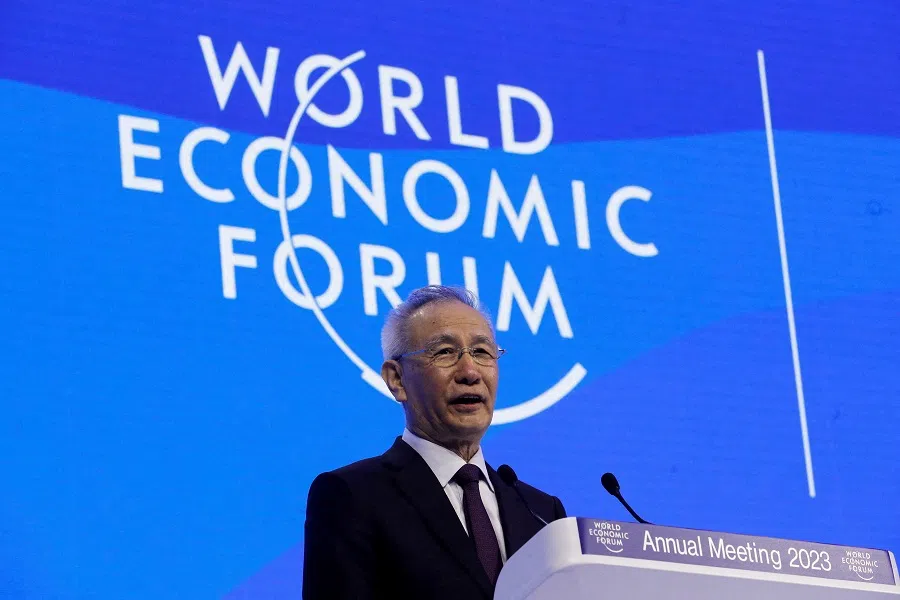
To what extent do you think the commercial relationship between the US and China will be undermined by politics, given that some US politicians' "China bashing" actions have influenced US public opinion?
I hope most of it is rhetoric. Because when you speak to companies in the private sector, they want global trade to continue to increase between China and the US. But policymakers will have to then make the decision to balance security and economy. We understand countries are looking at the issue of security, but it cannot be too much at the expense of growth. If you go too far on one side of the spectrum at the expense of growth, populations will suffer as inflation and the cost of living will go up. So there's a balance that we need to look at.
We do not want to take advantage of the situation between China and the US...
As Malaysia has ratified the Comprehensive and Progressive Agreement for Trans-Pacific Partnership (CPTPP) and the Regional Comprehensive Economic Partnership (RCEP), is there an issue that Malaysia has to choose a side because of the US-China tension?
We don't choose a side. We don't have to choose a side. And globalisation is about not choosing a side. In fact, since independence in 1957, we've never chosen a side. Our top two trading partners are China and the US. The US is not part of the CPTPP. But again, what's important for us is to continue to engage with all sides for the good of trade, the good of business. And this is something that the world also needs to focus on.
We do not want to take advantage of the situation between China and the US, and we also do not want to take for granted the relationship that we have built for many decades. For Malaysia, a medium-sized country and an emerging economy, we want to see trade between China and the US prosperous because we stand to benefit from that. In fact, globally everyone stands to benefit from that.
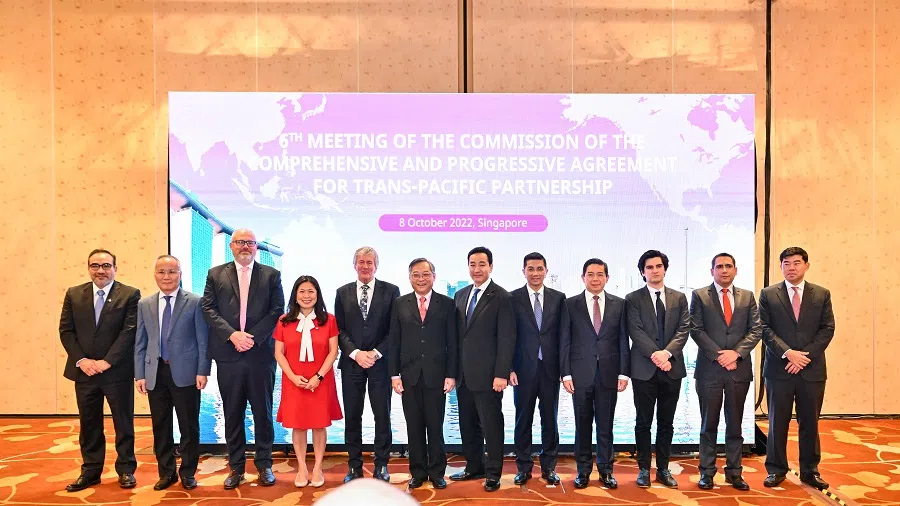
What's Malaysia's attitude toward China's application to join the CPTPP?
Our attitude is simple. We are supportive and positive on the inclusion of China into the CPTPP.
What do you think of the CPTPP and RCEP? To what extent can these two agreements boost Malaysia's economy?
We ratified the RCEP in February last year and the CPTPP in November. We're already seeing the results. We just announced Malaysia's trade reached 2.8 trillion ringgit (about US$660 billion) in 2022, a new record, surpassing the target we set for 2025. It shows that these agreements do help Malaysian companies and the Malaysian economy. The calculation of GDP has to take into account trade numbers. Our GDP number for 2022 is very strong. The third quarter itself saw a 14.3% growth.
The Malaysian economy has rebounded very rapidly, but it also faces inflationary risk, credit risk, and geopolitical risk. What's your outlook for the Malaysian economy?
As I mentioned before, Malaysia's economy is a very open economy. So what happens in the world will also have an impact on Malaysia. This year, we are forecasting 4% to 5% GDP growth. That's definitely much slower than the growth of 7% to 8% last year.
We have to be mindful of things that we need to do. That's why investment is important. Trade is important. Inflation is under control at around 4% today. This is because we are using fiscal reserves. We have a lot of subsidies on energy prices that has helped control inflation. I think in the long run it's going be costly for the government.
Malaysia just had a general election. What challenges would that bring to Malaysia internally? What's your focus as the minister of international trade and industry?
The general election is every five years. So now we've got five years to make the right policies and have the will to implement policies that are good for the country and for the people in Malaysia.
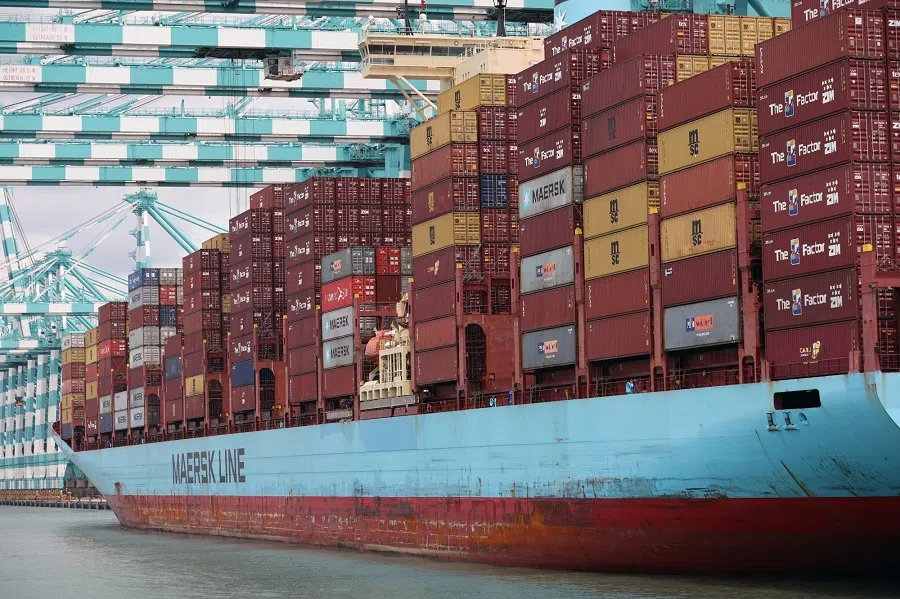
In the Ministry of International Trade and Industry's case, one of the major issues that we need to look at is on sustainability. We're looking at coming out with a framework for industries on how to understand ESG for Malaysian industries. We don't have that yet. Number two is doing business as competition is getting stiffer in Southeast Asia. Before, Malaysia was one of the top in terms of productivity, but now everyone has caught up in this region.
So for Malaysia, we need to re-look our strategy. I've only been the minister since December 2022. One of my key focuses will be to look at how to make it attractive and easy for investors and trade to happen in Malaysia. I think there's a lot of room for improvement.
You're positive about China's reopening. But during the past three years of the pandemic, there have been many doubts and concerns about China's supply chain situation. How do you see China's supply chain recovery? How do you see the matter of balancing the supply chain relationship between China and ASEAN countries? And in particular, how do you see the future prospects of supply chain cooperation?
There are positive spillover effects because of geopolitical concerns. In China, the US, and even in Russia and Ukraine, companies and countries are making policies to ensure that their supply chain is resilient. So Malaysia and other ASEAN countries are benefiting from that. But it's not immediate. It will take three to five years for factories to build plants and get all the things required.
There will be a lag, but we've seen commitment when we look at investment. Some will be realised in the next two to three years. We're seeing that increase, not just from the US or other European countries, but also Chinese companies. It takes time to transition. There are issues of supply chain and others that are not so simple to tackle. One is human capital. It's not easy after the pandemic - labour issues from truck drivers to engineers. When you want to reshore or onshore to other countries, you must have the right infrastructure, the right ecosystem of people and the technology. Malaysia has benefited from that because we have infrastructure and the people. We are seeing the positive things.
When we talked to the US-ASEAN chambers (of commerce) and the Chinese chambers, they all looked at this more optimistically than some of the policymakers. They are optimistic in the sense that if you look at the friends of the US, such as Europe and Japan, they still want to do trade with China. It's not like the Ukraine-Russia issue, which is very clear.
India has overtaken China this year as the most populated country. The US can do what they want, but all the markets in Europe, Africa and East Asia will look at China and India.
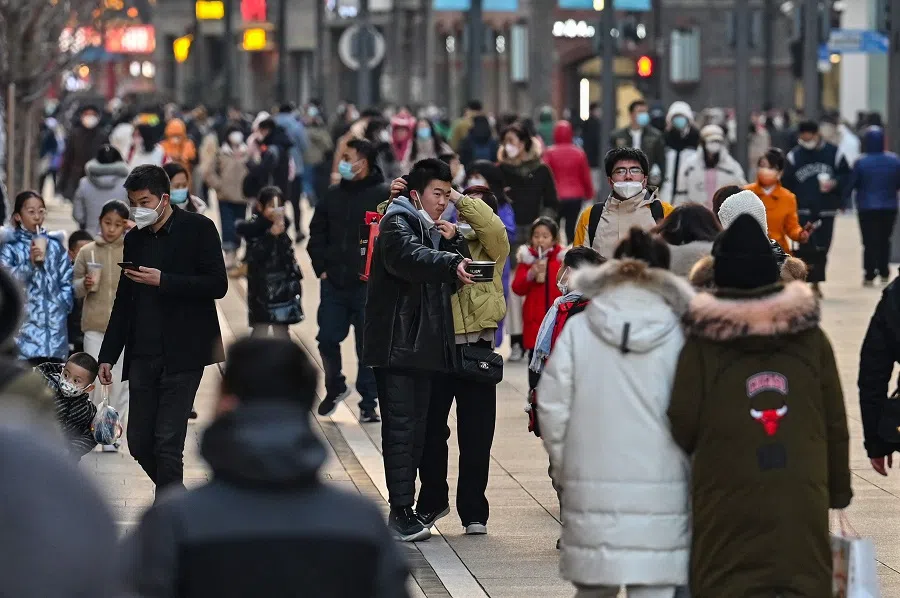
At the end of the day, where is the market going to be in the future? Where is the population? India has overtaken China this year as the most populated country. The US can do what they want, but all the markets in Europe, Africa and East Asia will look at China and India. I think we need to go back to the basics.
I hope the leaders will then understand that at the end of the day, what's important is that the global economy continues to grow so that we can have that stability not just in politics but also economy.
Are you worried about the negative impact of a strong dollar on the emerging economies?
The strong dollar has been impacting all countries. I think, more importantly, we need to rethink how monetary policy dictates global economy. The US dollar strengthened because of what's happening in the US, but unfortunately, the policy in the US affects the global economy.
For Southeast Asia, especially the less developed countries, they will see deficits going up, because they cannot subsidise their energy prices as they're not net exporters of energy. That has resulted in higher cost of living and slower growth in those markets.
Ying Chuyan contributed to the story.
This article was first published by Caixin Global as "Q&A: Malaysia's New Trade Minister Explains Why China Matters to Southeast Asia". Caixin Global is one of the most respected sources for macroeconomic, financial and business news and information about China.



![[Big read] When the Arctic opens, what happens to Singapore?](https://cassette.sphdigital.com.sg/image/thinkchina/da65edebca34645c711c55e83e9877109b3c53847ebb1305573974651df1d13a)

![[Video] George Yeo: America’s deep pain — and why China won’t colonise](https://cassette.sphdigital.com.sg/image/thinkchina/15083e45d96c12390bdea6af2daf19fd9fcd875aa44a0f92796f34e3dad561cc)